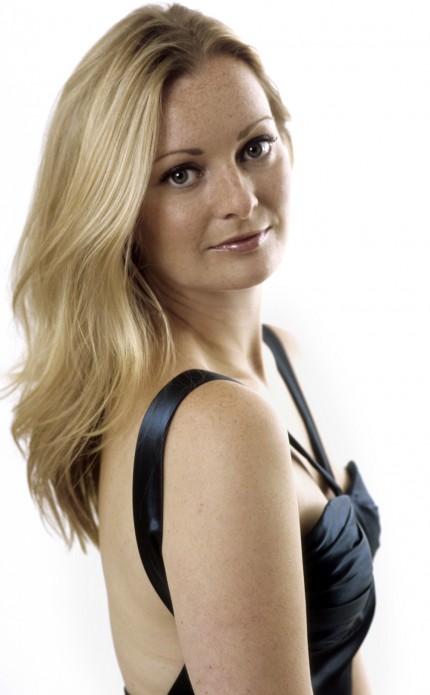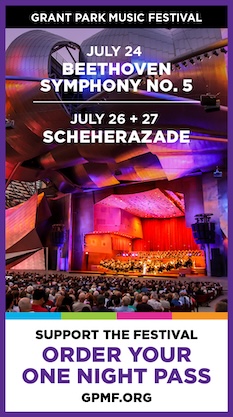Soprano Lucy Crowe, conductor Bicket spark memorable night of Handel with Baroque Band

There are times where the combination of artist, repertoire and venue all work together so gloriously that you almost pinch yourself to see if such an epiphany is for real. Such moments are rare, to be sure, and when they occur, they make the critic’s lot a remarkable joy.
Such was the case Friday night at the Music Institute of Chicago in Evanston where Baroque Band held court under guest conductor Harry Bicket and soprano Lucy Crowe. The British musicians are currently wrapping their appearances in Handel’s Hercules at Lyric Opera. Baroque Band director Garry Clarke — who had worked with Bicket on numerous occasions in Europe — scored a huge coup by taking advantage of that fact and persuading them to perform with Baroque Band on nights off from the Lyric.
“If you say ‘Handel’ today,” said Bicket in candid remarks, “people think ‘Messiah’ and ‘Water Music.’ If you said ‘Handel’ in the 18th century, people thought, ‘opera.’ ”
Bicket then offered the Overture and the ballet music from Act II of Handel’s Ariodante, his opera seria from 1735 which featured a “dream sequence” ballet more than two centuries before that same device became a template in American musical theater via Rodgers and Hammerstein.
The dream movements — crisply played with spirit and finesse by the Baroque Band strings with Bicket conducting from the harpsichord — alternated between ecstatic and nightmarish in French-influenced dance movements with Scottish touches in deference to the opera’s setting, culminating in a grand fugue between the good vs. bad dreams with an ambiguous conclusion.
Without a pause, Crowe, who had sat on stage while the suite was performed, proceeded to offer three arias from Handel’s Guilio Cesare, which, performed in sequence, offered a narrative arc of Cleopatra’s development across the opera.
We watch Cleopatra go from plotting her seduction of Caesar to advance her political ambitions in Tu la mia stella sei, to finding herself actually falling in love with Caesar in Se pietà di me non senti, and ending with the penultimate vocal showpiece of the work, Da tempeste il legno infranto.
Those who have heard Crowe sing Iole in Handel’s Hercules (which runs through Monday) knows that hers is a voice of liquid gold, the kind of sound that we imagine divas of Handel’s day having but a complete incarnation of which rarely occurs. Not that there have not been other fine singers of this music, to be sure, but there has been no one who—at least, in this listener’s experience—has been able to put all of the goods together in such a remarkable way.
Though Crowe is able to fill the Civic Opera House with her sound, to hear her more intimately in a smaller venue and with a consort of period instruments gives new context to her art form. The technique is so complete and assured that she can put her voice thorough musical and dramatic disposal.
Whether Crowe is singing about the confusions of love or the tender, poignant Lascia ch’io pianga from Handel’s Rinaldo-–performed as an encore—-the vocal line is so organic that you are not even aware of the extraordinary technique needed to produce it. And when Crowe does a vocal showpiece, her breath control, musicianship, and lightning ornamentation are such that what sometimes seem as vocal peculiarities in Handel come off so naturally that you find yourself having “ah-ha” moments, thinking “so that’s what he had in mind.”
None of this takes anything away from Bicket’s contributions to the evening, which were no less revelatory. The program began with an upbeat performance of Corelli’s Concerto Grosso Op. 6, No. 9 and Bach’s Second Suite for Orchestra in b minor with Leighann Daihl as flute soloist, and which spotlighted some of the most spirited, stylish and nuanced playing ever heard from Baroque Band. Indeed, having a first-class Baroque conductor like Bicket leading the ensemble seemed to lift Baroque Band’s performances to a whole new level.
The program repeats 7:30 p.m. Sunday at Symphony Center’s Grainger Ballroom, 220 S. Michigan Ave.; $15-$35; baroqueband.org; (312) 235-2368. Also Crowe can be heard in the final two performances of Handel’s Hercules, conducted by Bicket, at the Lyric Opera 7:30 p.m. Saturday and Monday. lyricopera.org. 312-332-2244.
Posted in Uncategorized
